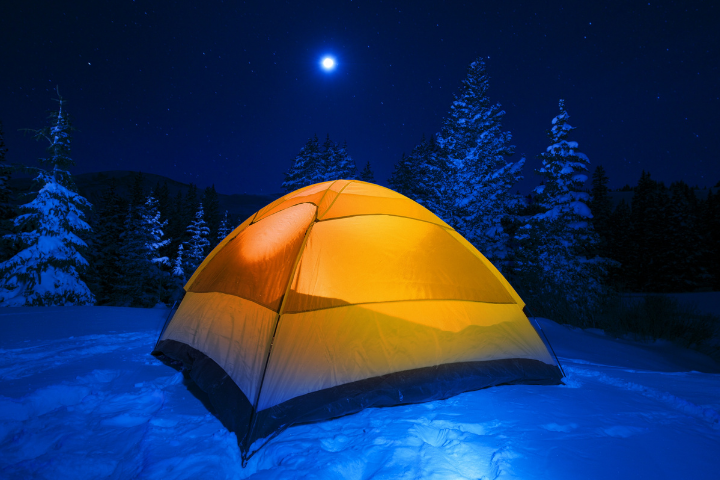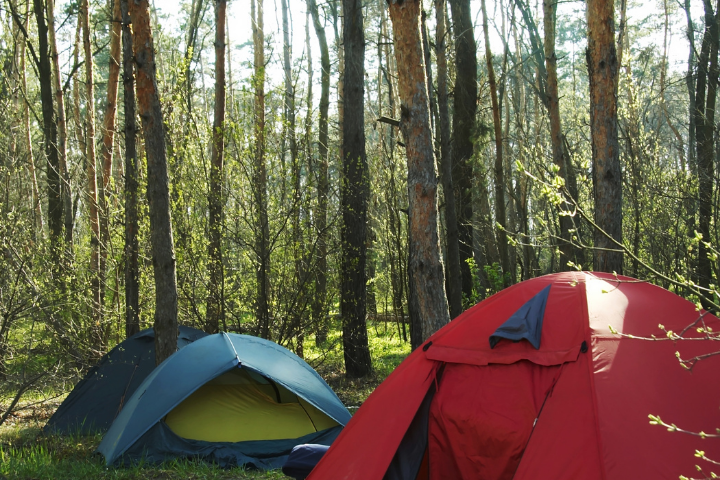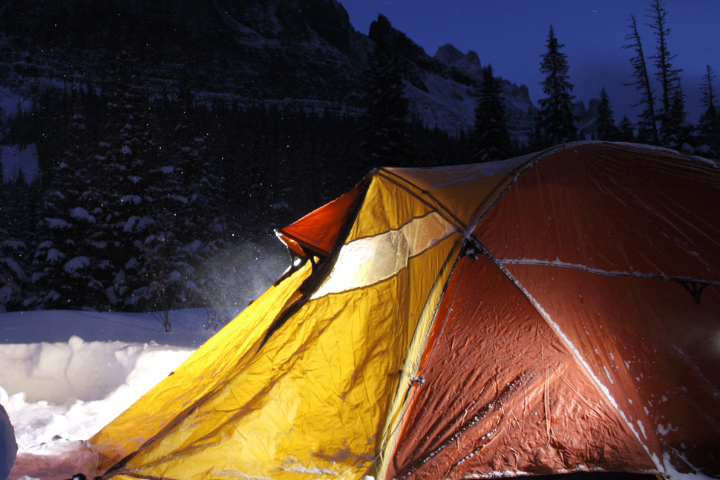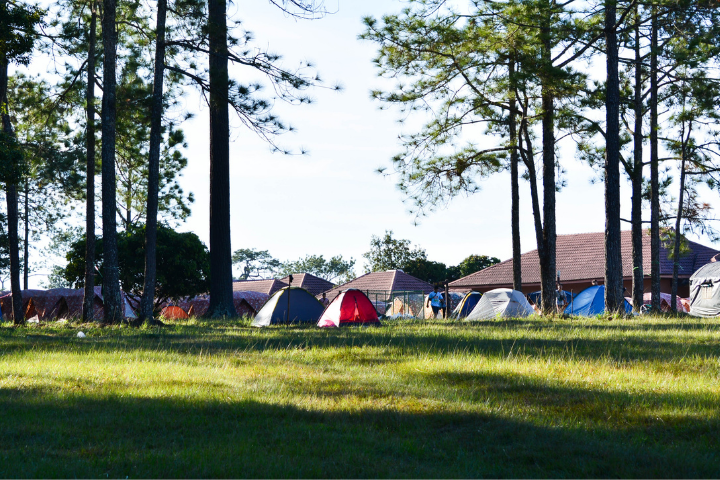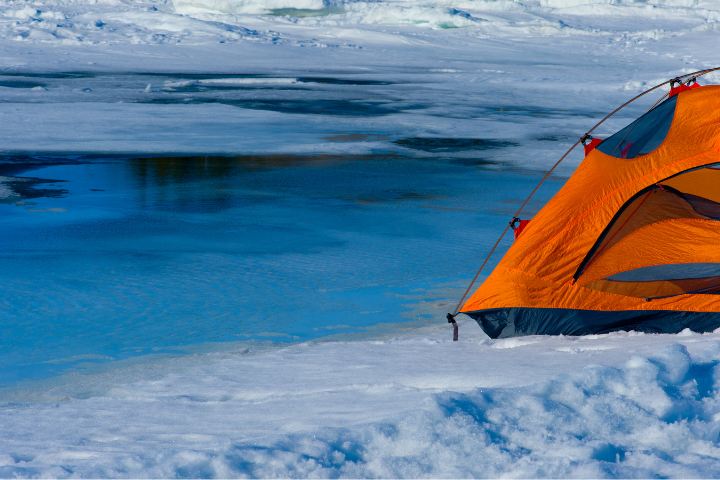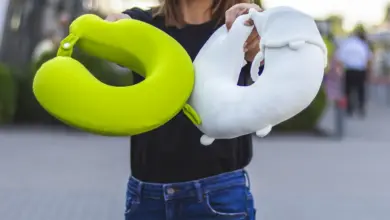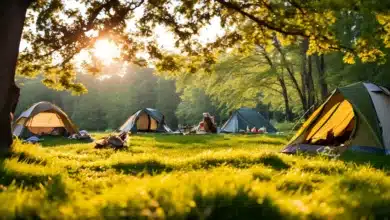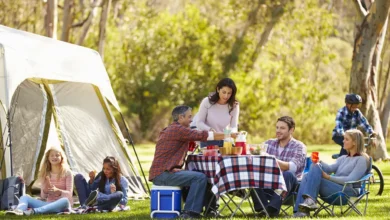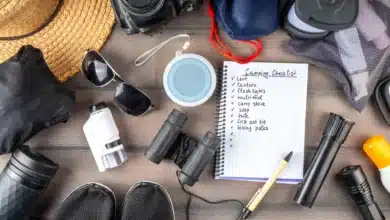How To Heat Tent Winter Camping In 7 Easy Ways
Planning to go camping but afraid of the cold? I have shared my secret methods in this article on how to heat tent winter camping.
Winter camping has its own charm. You get to see the beauty of nature covered in the snow without worrying about bugs and humid conditions.
However, there is something that can ruin your great experience. Usually, cold nights in the winter are the biggest hurdle in winter camping, as keeping your tent heated during the freezing winter is not an easy task.
But don’t worry; there are multiple ways to ensure that your tent remains a warm place amidst the snow. I will be listing many different methods to heat your tent, where some will be traditional methods, and some will be incorporated with technology.
Heating The Tents: Traditional Ways
By using traditional ways for heating tents, I mean not using any electricity or battery source. Don’t get me wrong here; bringing some technology with you helps, but it’s not absolutely necessary. Besides camping, the old-school way is just more adventurous.
There are four methods you can use to warm your tent without any modern equipment. I can assure you that all these methods are not dangerous to use. Don’t worry; I won’t suggest you set the tent on fire.
What helps the most in heating tents the traditional way is thermal mass. Thermal mass is the capacity of a material to store and absorb heat from an external heat source like a campfire or sun and release it gradually with time.
The thermal mass of any material is among the best way to heat a tent during winters. Water has the highest thermal mass of most conventional materials like concrete, sandstone, water, brick earth wall, etc.
So let’s find out some of the traditional ways to keep your tents warm.
You might like to read: How To Make Your Winter Sleep System: Complete Guide
#1 Heating The Tent With Hot Water Bottles
Farmers use this process to heat big greenhouses with barrels and water. You can use the same method to heat your tent too. This method primarily works best for smaller tents.
The prerequisite for this method will be a bunch of metal bottles or hard plastic bottles. You would also require a fire. You will have to heat the water to nearly its boiling point; therefore, make sure not to use regular supermarket plastic bottles. Remember to carry a boiling pan or anything else to heat the water.
When the water temperature goes high, transfer the water securely in hard plastic or metal bottles and spread the bottles evenly inside the tent. If you follow this simple process correctly, the bottles will release heat for extended periods, preventing the tent’s temperature from going up.
Thanks to the high density of the water, it’s probable that the water will be warm till morning. If you find that the tent is not as warm as it should be, then keep the bottles much closer to your body for better heat.
Note: If the bottle’s volume is high, water will store and release heat for a more extended period.
#2 Heating Rocks
Heating rocks to keep your tent warm uses the same principle as we discussed with water bottles but with a slightly altered approach. In fact, you can heat your tent with stones even quicker than water bottles, but a huge differentiator is that stones won’t store heat for more extended periods.
I have made this method simpler by breaking it down into easy steps:
- Find a bunch of stones near the camping area. If you find it challenging to find stones, then try to go near a river or stream. You will definitely find a lot of stones near a river.
- Start a fire near the tent and place all the stones close to the fire.
- Never put stores directly in the fire; otherwise, it will be pretty tricky to take them out. Besides, taking charred stones inside your tent is ever a good idea.
- Just thirty minutes before you go to sleep, use some textile material or cloth to wrap the stones. You need to be careful because the stone will be hot.
- After wrapping the stones in cloth, spread them evenly inside the tent. Make sure to put most of the stones in the places you’re unlikely to touch, like the corners. If the stones are wrapped the right way, they will release a lot of heat, but the cloth wrapped around them will prevent the canvas from melting.
The best thing with heated stones is that they release heat quickly, but they get cold in just three to four hours. This method, combined with warm clothes, can keep you comfortable until the following day.
#3 Insulating The Tent
The purpose of insulating the tent is to the warmth of the tent inside and reflect it to you. It works better when combined with other heating techniques.
In fact, if it’s not too cold, then your body heat alone can keep the tent warm with insulation. Reflective foam or double air bubble reflective foil are some of the best materials to insulate your tent.
#4 Setting Up The Tent On Top Of A Died Campfire
It is among those ideas that are highly effective but not too popular. The theory is pretty simple and should work fine. I have again listed a simple step-by-step procedure for you to follow.
- The first thing will be to dig a ditch and ignite a campfire in it. Make sure the ditch is not too deep, but the width must be identical to your tent.
- Try to burn a lot of firewood as it will help you collect as many coals as possible.
- After the campfire dies, fill the ditch and set your tent above it. The heat will release gradually overnight.
Note: Don’t use an insulated sleeping pad on the tent floor if you adopt this technique. These sleeping pads reflect heat to their original source, which will only heat the tent’s ground rather than the whole tent.
Many people find this idea to be weird, but its inspiration is pit cooking. The pit cooking method has been followed for a long time. In this procedure, people used to dig a hole in the ground then wait till the wood burns out. After that, they would lay the meat within the pit and leave it to cook gradually for hours, and the area around it used to stay hot for extended periods.
Even if the idea sounds exciting and can be really effective, it has its own faults too. Two things coming to my mind are:
- In this case, you will usually require to wait till night to set your tents. But anyone who has ever camped knows how tricky it is to set camp at night.
- Another thing is that you will have to sacrifice your campfire, which is arguably the best part of camping. In my opinion, the best thing will be to ignite two campfires because there’s no fun in camping without it.
You might like to read: How to Keep Your Tent Warm and Cozy This Winter
Heating The Tents: Modern Ways
Now that we are done with the old-school camping methods in winter let’s look at some modern techniques. The methods we just discussed will work well with smaller tents but not with larger ones. You would require modern techniques for them.
Modern techniques are great, but some are risky, and you don’t want that while camping with the family. A hot radiator might wake you up every ten minutes in the worry of your tent catching fire.
Let’s see some of the modern techniques to keep you warm during winters inside the tent.
#1 Electric Blanket
Using electric blankets might not heat the tent, but it will surely keep you warm throughout the night. There are actually not too many options to heat your tent safely, especially buying a tent stove or a propane gas heater isn’t very safe (I will discuss it later).
Electric blankets can work pretty well as long as you find the ones that require less power. Electric blankets are usually safe to use as the electric wires are covered with fabric. The blankets won’t touch you directly, and they also have an auto-switch off in case it gets too heated.
If you are carrying an electric blanket, you don’t really require to heat your tent any more.
The temperature of the blanket generally ranges from 77°F (25°C) to 118°F(48°C). An average person usually finds a temperature slightly more than body temperature to be the most comfortable.
Another great thing is that these blankets usually last long (mostly ten years) if only used for camping purposes. But it has some drawbacks too, including:
- After a while, there will be a decrease in the wire’s conductivity resulting in the maximum temperature dropping a bit and increasing the power consumption simultaneously.
- You will require a power source, which is a huge drawback. You can use little generators too, but they are not easy to carry and are highly expensive. I won’t recommend buying one just for the electric blanket.
Note: Never use electric blankets while sleeping in a sleeping bag. A small amount of heat produced by the electric blanket needs to dissipate to help with overheating naturally. Using it inside sleeping will cause overheating.
#2 Underfloor Heating Carpets
Underfloor heating carpets are still pretty new in the market. They are a bit similar to electric blankets but have an added benefit. Unlike electric blankets, you can lay this carpet on the whole tent floor and also use a sleeping bag without worrying about overheating.
Set-Up Instruction: I will recommend you use a heat reflective mat under the carpet to prevent the cold air coming from the ground from getting in. The heat of the carpet will release inside the tent and not heat the soil.
#3 Portable Electric Radiators
There is a reason why I have put this one at last. It is among the most obvious ways to heat your tent and one that is pretty popular. A portable radiator usually heats your tent pretty quickly, but right after switching the heater off, you will start freezing again within minutes.
The warm air generated through the radiator will escape the tent and lower the tent temperature yet again.
Still, most people like portable heaters because they are pretty straightforward to use. It is better to go for oil-filled radiators as they won’t produce loud fan noises like most heaters, and the heat is also a bit more realistic.
A major drawback is that you would require a camping generator as heaters require a high power source. They are hard to carry, too, due to the oil weight.
What Type Of Heat Sources Are Not Good For The Tent?
Gas heaters or tent stoves are widely used for heating tents, but they are very harmful. These heaters emit carbon monoxide (CO), which is among the most hazardous gases for humans. You should use heat sources emitting CO only in ventilated areas.
But trying to improve the ventilation of a tent will mess with its insulation which is not recommended at all during camping in winters. Besides, when propane burns, it creates water lowering the tent temperature even further.
You might like to read: Best Extreme Weather Tents
Frequently Asked Questions
How do you heat a tent in the winter?
Heating the tent in the winter includes several ways:
- Keeping hot water bottles inside the tent
- Keeping heated rocks inside the tent
- Insulating the tent
- Setting the tent above a dead campfire
- Portable electric radiators
- Underfloor heating carpets
Is there a safe way to heat a tent?
Most traditional methods are entirely safe to heat your tent, including using hot water bottles or rocks inside the tent. You can also set your tent above a dead campfire and insulate your tent. You may need to use multiple ways together to heat the tent properly.
How do you keep a tent warm without electricity?
The multiple ways include:
- Keeping hot water bottles and rocks inside the tent.
- Insulation
- Placing the tent above a campfire after it dies.
How cold is too cold for tent camping?
The nighttime temperature of around 35-55 Fahrenheit can be considered too cold for tent camping.
Wrap Up
This article had everything you need to know about heating a tent in winter. I hope the methods mentioned in the article prove to be useful for you.
Happy Camping!
